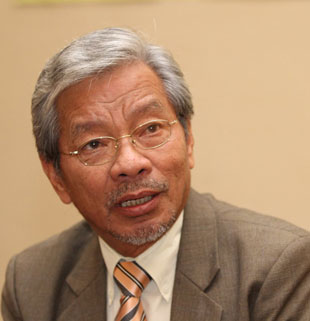
Tan Sri Dr James Jemut Masing
KUCHING: The state government is still accepting applications from employers for hi ring foreign workers as it has yet to adopt the federal government’s recent announcement on freezing the intake of foreign workers.
Land Development Minister Tan Sri Datuk Amar Dr James Masing said the state government would consider the applications on a case-to-case basis.
“The state government has not yet adopted the freeze, so applications are still open to hire foreign workers,” he told reporters yesterday.
He said the state had its own source of foreign labourers and it depended highly on Indonesian labourers, especially in the plantation sector.
However, it is increasingly difficult to hire worker s from Indonesia because they preferred to work for plantations in their own country and be close to their families, he added.
He said the state had been losing RM1 billion annually mainly due to the uncollected fresh fruit bunches (FFB) as the plantations in the state were facing severe shortage of manpower, especially harvesters.
Currently, he added, there were 103,000 workers in the oil palm industry, out of which 22per cent were locals, and the foreign labourers were mostly Indonesians, hired as harvesters, field and general workers.
“We don’t have enough workers in the oil palm industry, and we cannot afford to lose RM1 billion a year due to the uncollected FFB.
“We need another 30,000 to 35,000 workers and most of them are for harvesting,” he explained.
He added: “We need foreign labourers but at the same time we received many criticisms from NGOs. We don’t want to get foreign workers, but we have no choice because the locals don’t want to do 3D (dirty, difficult and dangerous) jobs.”
Therefore, he urged nongovernmental organisations
(NGOs) to attend the ‘Addressing Manpower Needs of the Oi l
Palm Industry in Sarawak 2016’ seminar, which will be held at Riverside Majestic Hotel from 8am to 5pm on March 30.
This will be the time they can share their solutions to the acute shortage of labour in the plantation sector, he said.
